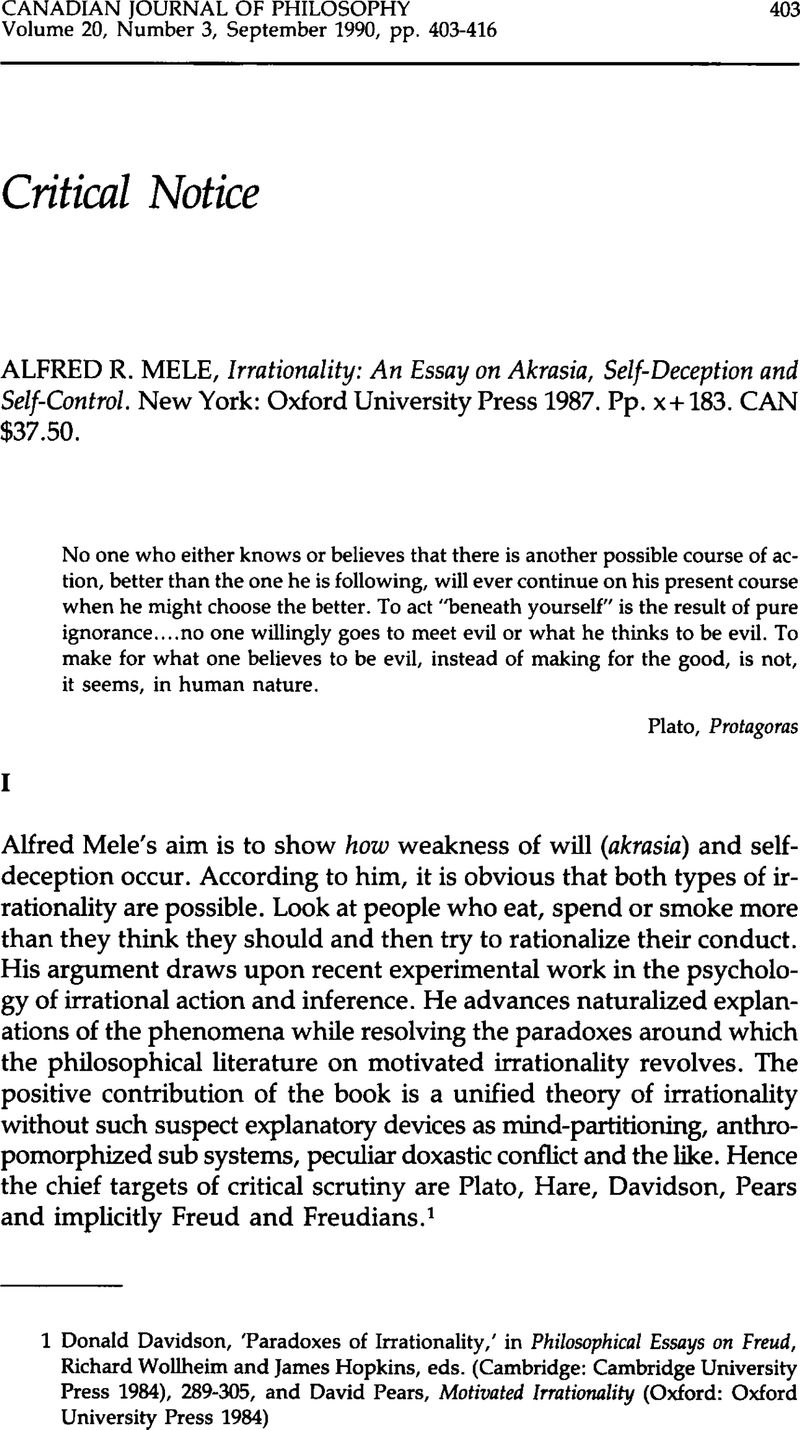Published online by Cambridge University Press: 01 January 2020

1 Donald Davidson, Paradoxes of Irrationality, in Philosophical Essays on Freud, Richard Wollheim and James Hopkins, eds. (Cambridge: Cambridge University Press 1984), 289-305, and David Pears, Motivated Irrationality (Oxford: Oxford University Press 1984)
2 George Ainslie, Specious Reward in Psychological Bulletin 82 463-96; and A Behavioral Economic Approach to the Defense Mechanisms in Social Science Information 21 735-80
3 Plato, Protagoras, in The Collected Dialogues of Plato, Edith Hamilton and Huntington Cairns, eds.; W.K.C. Guthrie, trans. (New York: Pantheon Books 1961), 358 c-d
4 Plato, Republic (Paul Shorey, trans.) 439-40 and 580-1
5 Aristotle, Nichomachean Ethics, Terence Irwin, trans. (Indianapolis: Hackett 1985), 1150 b, 20-5
6 R.M. Hare, Language of Morals (Oxford: Oxford University Press 1952), 169. I regret that I cannot do full justice to Hare's views in this very brief sketch.
7 R.M. Hare, Freedom and Reason (Oxford: Oxford University Press 1963) 77 and 80
8 Donald Davidson, How is Weakness of Will Possible? in Essays on Actions and Events (Oxford: Oxford University Press 1980), 42
9 Alfred R. Mele, Irrationality (Oxford: Oxford University Press 1987), 7
10 Plato, Cratylus (Benjamin Jowett, trans.), 428 (7-d8)
11 Joseph Butler, Upon Self-Deceit in The Works of Joseph Butler, Vol.2. W.E. Gladstone, ed. (Oxford: Clarendon Press 1896)
12 See the bibliography in Mike W. Martin, ed., Self-Deception and Self-Understanding (Kansas: University Press of Kansas 1985). See especially the entries under Terence Penelhum, John King-Fariow, Jeffrey Foss and Bla Szabados. The most impressive contribution from England is that of David Pears in his book Motivated Irrationality. In the United States, the work of Robert Audi is prominent in its analytical rigor and comprehensiveness.
13 Alfred R. Mele, 136
14 Ibid., 109
15 Ibid., 84-95
16 Ibid., 136
17 Ibid., 127
18 Ibid., 151
19 Ibid., 141 and passim
20 Ibid., 50 and passim
21 Ludwig Wittgenstein, Philosophical Investigations (Oxford: Basil Blackwell 1963) 232c
22 Mele, 123
23 Ibid., 133
24 Ibid., 138-59
25 Leon Festinger, The Theory of Cognitive Dissonance (Stanford: Stanford University Press 1957)
26 Leon Festinger, Conflict, Decision and Dissonance (Stanford: Stanford University Press 1964), 82
27 Mele, 24
28 Thomas C. Schelling, The Intimate Contest for Self-Command, in The Public Interest 60 94-118
29 I am grateful to John A. Baker and Kai Nielsen for comments on an earlier version of this essay.